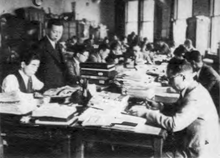Tokubetsu Kōtō Keisatsu
The Tokubetsu Kōtō Keisatsu ( Japanese. 特別 高等 警察 , dt. "Special Higher Police"), often abbreviated as Tokkō ( 特 高 ), was a Japanese police unit founded in 1911 whose main task was to monitor political groups and ideologies, which as Were deemed to be a threat to public safety . Because of this task, it was also known as the Public Security Police ( 治安 警察 , chian keisatsu ) or under the Orwellian term thought police ( 思想 警察 , shisō keisatsu ), where thought crimes were dangerous ideologies.
Their main task was to serve as a civilian counterpart to the military kempeitai . Coarse they may be related to the combination of crime fighting and counter-intelligence with the FBI of the United States are compared.
The high treason affair of 1910 was the impetus for the establishment of the Tokkō under the auspices of the Interior Ministry . Through the Russian Revolution , the rice riots of 1918 and the Samil uprising in Korea, the Tokkō was greatly enlarged under the government of Hara Takashi and the subsequent prime ministers. She was mainly responsible for the threats to the system posed by anarchism , communism , socialism and the growing foreign population, but also dealt with religious groups, pacifists , liberals and the far right.
After the passage of the Law to Maintain Public Security in 1925, the Tokkō was vastly enlarged. Departments have been set up in every prefecture, major city, and overseas locations with large Japanese populations, such as Shanghai , London, and Berlin .
In the late 1920s and 1930s, the Tokkō launched an ongoing campaign to destroy the Japanese Communist Party , with mass arrests of members and known and supposed sympathizers.
The Tokkō consisted of seven departments:
- Special police tasks I and II ( 特 高 一 課 , tokkō ikka and 特 高二 課 , tokkō ni-ka )
- Worker ( 労 働 課 , rōdō-ka )
- Censorship ( 検 閲 課 , ken'etsu-ka )
- Foreign Affairs ( 外事 課 , gaiji-ka )
- Domestic Koreans ( 内 鮮 課 , naisen-ka )
- Arbitration ( 調 停課 , chōtei-ka )
In 1927 a subdivision was set up which dealt with the analysis of various ideologies in order to identify any potential danger at an early stage.
There were both uniformed and non-uniformed officers and a large network of informants . These informants were often undercover agents who infiltrated suspicious organizations and acted as agents provocateurs . Other informants were members of the neighborhood associations ( Tonarigumi ). In the course of counter-espionage, telephones and radio traffic within and near Japan were also monitored.
Between 1928 and 1943, the Tokkō had arrested a total of 64,844 people for alleged violations of the law for the maintenance of public security and brought more than 5,000 to court by 1936. About half of them were sentenced to prison terms. Prisoners were forced to write reports of exposure to dangerous ideologies over and over until their guards were satisfied with them. The reports were then used to prove the accused's involvement in crimes.
In the persecution of political opponents who had been pushed underground, namely communist activists, the Tokkō proceeded increasingly brutal and did not shy away from the use of torture. Her best-known victim is the communist-oriented working-class writer Takiji Kobayashi , who was tortured to death by members of the Tokkō in 1933. Due to the increasing brutality and arbitrariness of the Tokkō at the beginning of the war and their penetration as a thought police into large areas of daily life, critics have pointed to analogies to the Soviet GPU on the one hand and to the German Gestapo on the other. Defenders of the Tokkō , mostly former high-ranking members, deny the systematic use of torture and claim that it was only used in isolated cases and on individual initiative. Today, however, a sufficiently large number of cases are known to indicate a regular and routine use of torture.
In October 1945 the American occupation authorities ( Supreme Commander for the Allied Powers , abbreviated to "SCAP") dissolved the Tokkō . The "Freedom Directive" ( 自由 の 指令 , jiyū no seirei ) of the SCAP, which also lifted other civil rights restrictions of the pre-war and wartime periods, led to the resignation of Prime Minister Naruhiko Higashikuni's cabinet .
literature
- Daniel V. Botsman: Punishment and Power in the Making of Modern Japan . Princeton University Press, 2004
- Peter J. Katzenstein: Cultural Norms and National Security. Police and Military in Postwar Japan . Cornell University Press, 1996
- Elise Tipton: Japanese Police State Tokko. The Interwar Japan . Allen and Unwin, 2001
- Mark Mazower (Ed.): The policing of politics in the twentieth century: historical perspectives. Berghahn Books, 1997.
- Richard H. Mitchell: Janus-faced justice: political criminals in imperial Japan . University of Hawaii Press, 1992
Remarks
- ↑ See Elise K. Tipton: The Tokkō and Political Police in Japan 1911–1945 , in: The policing of politics in the twentieth century: historical perspectives, ed. v. Mark Mazower 1997, p. 221.
- ↑ See Elise K. Tipton: The Tokkō and Political Police in Japan 1911–1945 , in: The policing of politics in the twentieth century: historical perspectives, ed. v. Mark Mazower 1997, p. 213.
- ↑ See Elise K. Tipton: The Tokkō and Political Police in Japan 1911–1945 , in: The policing of politics in the twentieth century: historical perspectives, ed. v. Mark Mazower 1997, p. 221.
